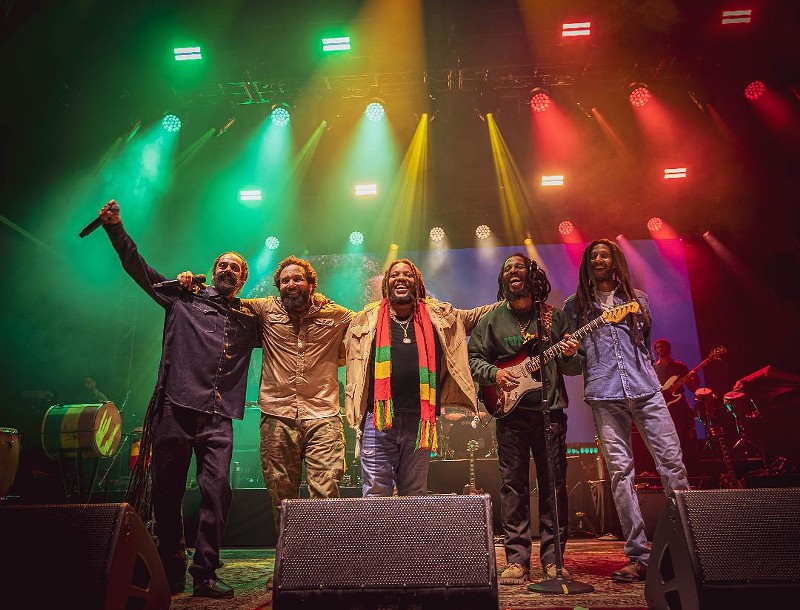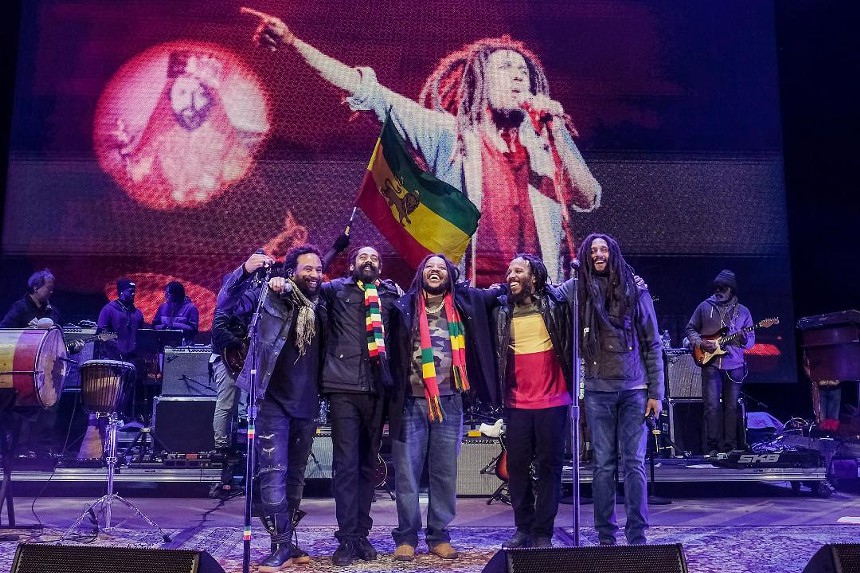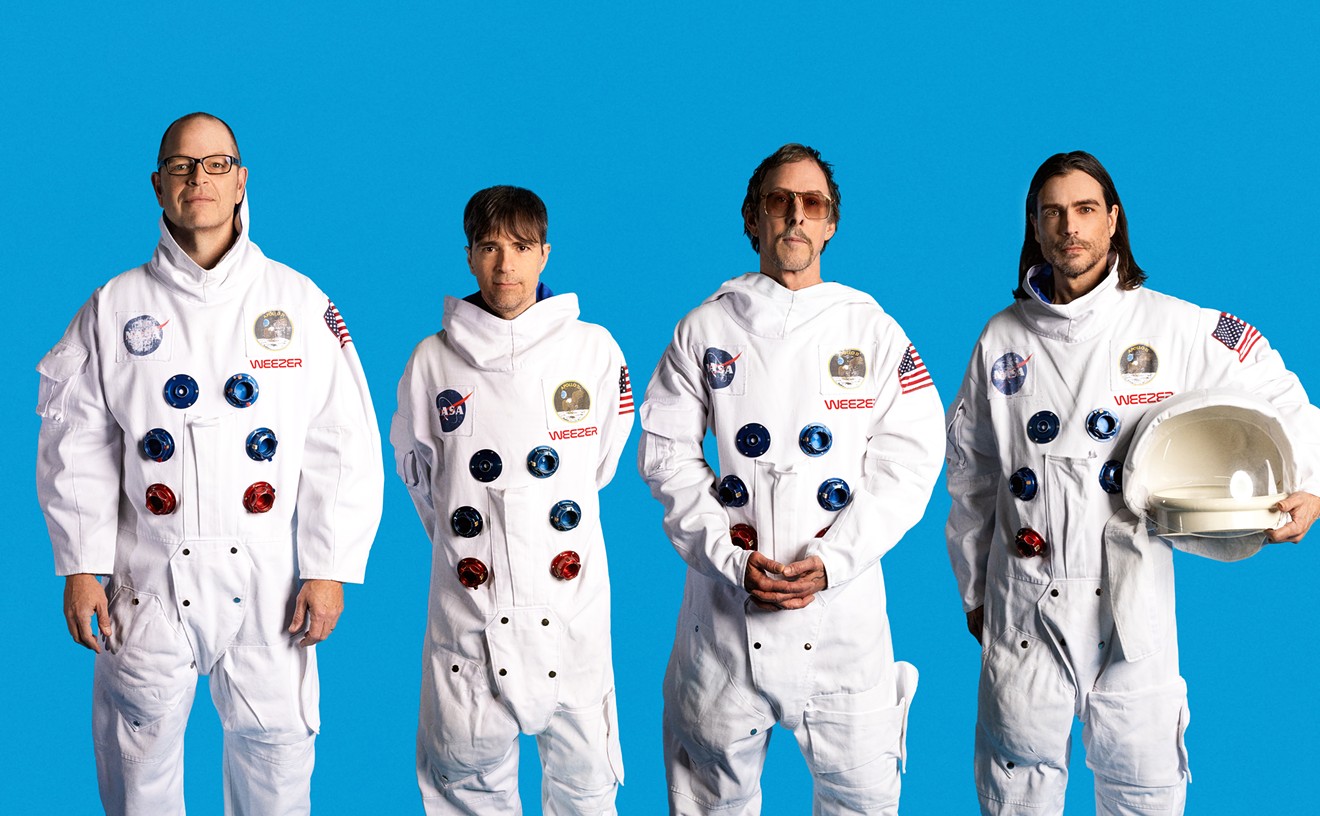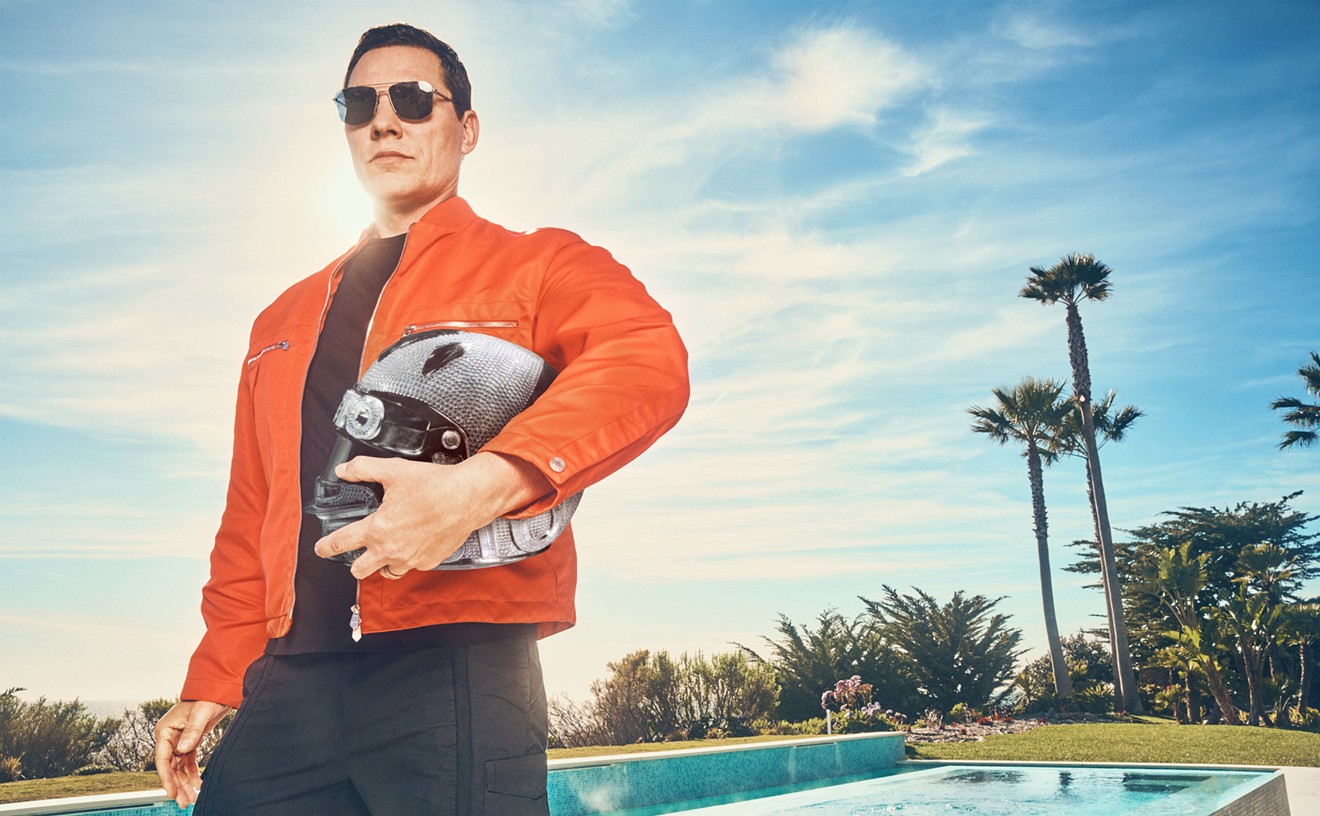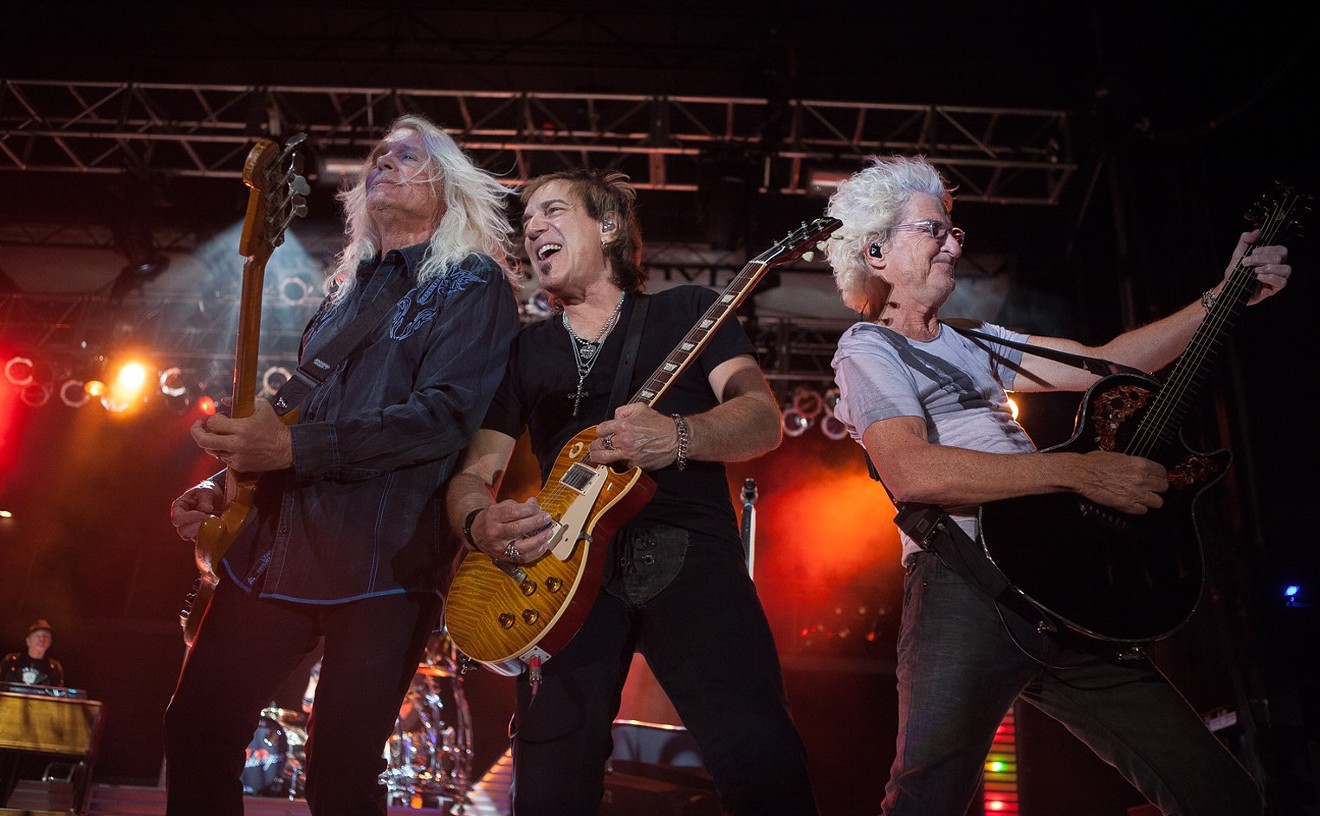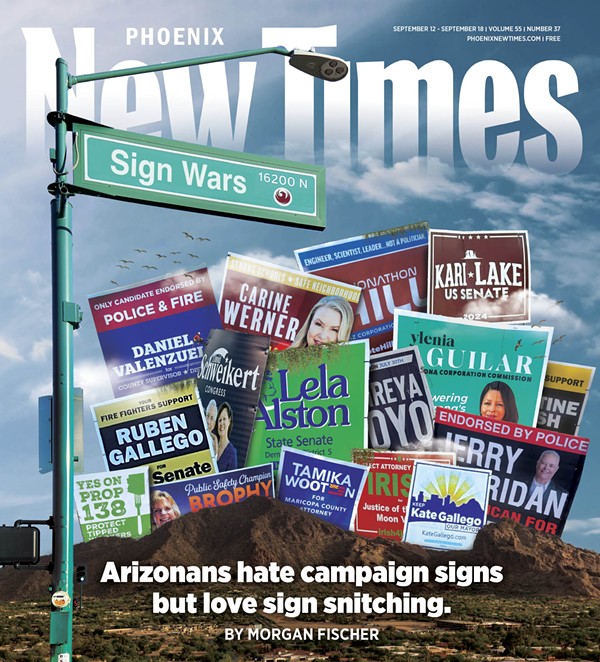Family musical legacies are not uncommon, but when it comes to real sonic royalty, there's few with reach and depth that span generations like the Marleys.
As a way of honoring what would have been their father’s 80th birthday, May 11, 2025, the five Marley brothers are on an early 22-date tour aptly titled "The Legacy Tour." They'll make a stop on Thursday in Phoenix at Talking Stick Resort Amphitheatre.
We all know Bob Marley was a reggae pioneer who's since been played in every dorm room in the U.S. He produced an impressive 13 legendary albums in 18 years. He was not only the genre's greatest international spokesperson, but he used his music to shine a light on racism, poverty, and injustice. Marley spread the word about the uniquely Jamaican religion, Rastafarianism, which was developed in the 1930s and a-OK with marijuana.
Bob Marley passed at the tender age of 36 in 1981 from malignant melanoma, but his talents live on in his five of his sons, each of whom have earned musical acclaim of their own accord. As the Marley Brothers, the quintet — made up of Ziggy, Stephen, Damian, Julian and Ky-Mani — earned their success with their own reggae style, including dance hall, pop and hip-hop into their sounds, whether as a group or solo. Over the years, the family has cleaned up at the Grammys, accumulating a total of 28 awards.
Phoenix New Times caught up with Ziggy Marley, the eldest brother, to discuss his spirituality, creativity and excitement about touring again with his brothers.
Phoenix New Times: So, what do you look forward to most on this tour with your brothers?
Ziggy Marley: We haven’t toured together in some time. It’s like a traveling family reunion, you know? We have a lot of fun. We enjoy each other’s company — joking around and making music together. We used to tour together as a family. It’s been a while, so it is very cool.
You have played Phoenix a number of times. What is your most cherished moment in Arizona?
What I remember is the Native Americans that came out to see us. Every time we come to Arizona, there’s always a contingency of Native Americans. They come out to support us and talk with us. I always remember Arizona for that reason.
How do you prepare for a tour and the day-to-day physical rigors of traveling?
My lifestyle is what it is regardless of if I’m touring or not. I try to eat properly and things like that. 'Cause when we perform, when I perform, it’s not a passive thing, it is a very active thing. So, my health and my fitness comes into play a lot. The body breaks down as the body gets older. I don’t get old — my body gets old. It’s the mechanical stuff, but I don’t feel much different. It’s the wear and tear [of the body], I’m realizing that now.
Who curated your list of songs for this tour, which we know will focus mainly on Bob’s songs?
That’s not my responsibility, that’s my brother Stephen’s. When we do the Marley Brothers tour, he’s the one who produces the show. He does a good job, so I trust Stephen, trust him with the Marley Brothers’ tour.
The Marleys have dominated the Grammy reggae category. Does acknowledgement like that get old?
When we grew up that was not how we were built. Even sometimes we don’t understand the importance of that. We are not from that culture. When all the people come to the shows that means more than awards. We see how the music affects the people [at shows]. That is the most important thing for us.
Miami has always been a special place, an oasis from the rest of the world. Bob recorded Rastaman Vibrations there in 1975. You and other family have lived there? What drew the family there?
The main draw is that that [Miami] is where my mother moved from Delaware, and my father would go down there a bit, and I would go down there a bit, and that’s where we go for our holidays. Miami is very close to Jamaica, not in miles, but the weather. We can grow stuff there like we do in Jamaica. It’s like a second home.
After some four decades of writing and recording, what is the main musical passion that still remains with you?
For me, it’s bringing me closer to a spiritual place. Connected to everything else, a part of the universe. That’s what I like. I want to accomplish more creativity. And, whatever else comes from that is fine, but creativity is what we yearn for, the inspiration.
What roles do your beliefs in Rastafarianism and Judaism play in your life?
The theology of the religion are the ideologies. Not the end of things, but the beginning of things. So, both things only help me to further search my truth. Find my philosopher, find my spirituality. I cannot be defined by any titles that are put on me. Rastafarian, Judaism, whatever — I am not defined by those things.
Beyond religion what do you aspire to gain from your beliefs and where does it take you?
Those things are opportunities to explore more and move and go beyond them. To learn more than what has been written in the book, to learn more than what has been told by people. 'Cause we have to find our own beliefs and direction. It opens our spiritual door. It’s not the end because spiritual growth is a continuous evolution. It’s not a finite thing. We are continuously evolving as human beings. And these things open the door to continue to evolve and not be stuck in any genre of belief, to be open-minded to become a better human being.
Marijuana has always been closely tied to reggae music culture. It's becoming less regulated in the States. Do you officially advocate for its legalization?
Marijuana. It’s now a way of life. We know so much more about it. I mean is a natural way of life. Some people use it for relaxation, some people use it for inspiration. Not in any official way, like lobbying government, but from our existence, it speaks for itself.
It's been six years since the release of your most recent solo album "Rebellion Rises" in 2018. What are your songwriting and recording plans in the near future?
I’m gonna go work on my next solo album. When I am on tour and right after I’m done with a tour, I am inspired. Like being around people, and singing for people, it gives me a good perspective. A lot of the songs I have been writing has to do with that mental state of mind. Trying to get a better mental state of mind, in terms of my mental health, and I can hopefully help people to relieve that stress.
It has been quite a journey for you, Ziggy. What is the best lesson you have learned along the way?
To persevere with purpose: That’s the biggest thing I feel. [My career] has given me purpose would be the lesson I have learned. And that purpose is not about the success but being true to your purpose in this industry, what you are here to do and not getting caught up in the trends. So it’s a perseverance thing and knowing of one’s purpose and remaining [true] to my purpose, my identity.
The Marley Brothers: The Legacy Tour. 7:30 p.m., Thursday, Sept. 12, Talking Stick Resort Amphitheatre, 2121 N 83 Ave., Phoenix; livenation.com.

Audio By Carbonatix
[
{
"name": "Air - MediumRectangle - Inline Content - Mobile Display Size",
"component": "18478561",
"insertPoint": "2",
"requiredCountToDisplay": "2",
"watchElement": ".fdn-content-body",
"astAdList": [
{
"adType": "rectangle",
"displayTargets": "mobile"
}
]
},{
"name": "Editor Picks",
"component": "16759093",
"insertPoint": "4",
"requiredCountToDisplay": "1",
"watchElement": ".fdn-content-body",
"astAdList": [
{
"adType": "rectangle",
"displayTargets": "desktop|tablet"
},{
"adType": "rectangle",
"displayTargets": "desktop|tablet|mobile"
}
]
},{
"name": "Inline Links",
"component": "17980324",
"insertPoint": "8th",
"startingPoint": 8,
"requiredCountToDisplay": "7",
"maxInsertions": 25
},{
"name": "Air - MediumRectangle - Combo - Inline Content",
"component": "16759092",
"insertPoint": "8th",
"startingPoint": 8,
"requiredCountToDisplay": "7",
"maxInsertions": 25,
"watchElement": ".fdn-content-body",
"astAdList": [
{
"adType": "rectangle",
"displayTargets": "desktop|tablet"
},{
"adType": "rectangle",
"displayTargets": "desktop|tablet|mobile"
}
]
},{
"name": "Inline Links",
"component": "17980324",
"insertPoint": "8th",
"startingPoint": 12,
"requiredCountToDisplay": "11",
"maxInsertions": 24
},{
"name": "Air - Leaderboard Tower - Combo - Inline Content",
"component": "16759094",
"insertPoint": "8th",
"startingPoint": 12,
"requiredCountToDisplay": "11",
"maxInsertions": 24,
"watchElement": ".fdn-content-body",
"astAdList": [
{
"adType": "leaderboardInlineContent",
"displayTargets": "desktop|tablet"
},{
"adType": "tower",
"displayTargets": "mobile"
}
]
}
]

